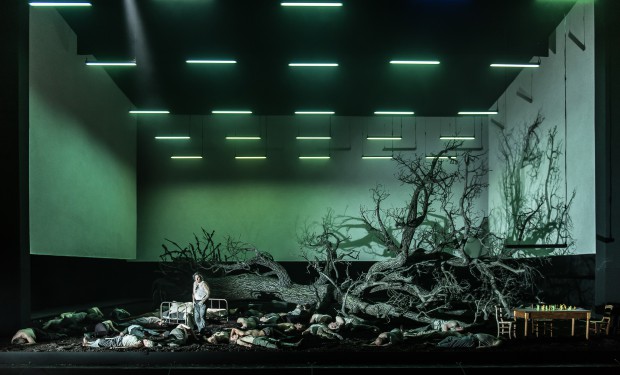There’s no such thing as a tasteful rape scene — or there certainly shouldn’t be. It’s an act of grossest violation, of primal violence. It’s also a reality — and a growing one at that — of contemporary warfare, a ‘weapon’ increasingly deployed strategically, coolly, by armies rather than individuals. Setting his new production of Rossini’s Guillaume Tell in the Balkan conflict of the 1990s, director Damiano Michieletto puts the issue front and centre in a scene whose music was almost lost on opening night in the extraordinary and unprecedented chorus of boos and catcalls from the audience.
The booers have ensured all conversation about the production is reduced to this one scene; ‘Gang rape and nudity at the Royal Opera House’, read the headlines. They aren’t wrong; the production is a bad one and the scene is unprompted either by music or libretto, but it’s still the wrong conversation.
That the debate, as it currently rages, centres on the acceptability of depicting rape on stage at all is worrying — a prudish self-censorship that places audience comfort above all, missing, or denying, the point of art. That some seem more concerned with the manner of its depiction — ‘gratuitous nudity’ is a phrase that has come up a lot — is even more worrying. No amount of euphemistic skirt-fumblings and decorous fadings-to-black (How naked is too naked?) can, or should, make it palatable.
Let’s talk instead about how Michieletto’s production — lazy in concept, violently ugly in execution — doesn’t earn the extremity of that scene. There’s an emotional and dramatic void at the core of the show, partly born of Rossini’s ponderous score (which has moments of astonishing beauty and drama, unfortunately stitched together into a rather unwieldy whole), but mostly sucked hollow by a director who misunderstands his material. To include all the opera’s ballet music but to deny it any dancers is misguided; to supplement that lack with second-rate mime from the singers is just plain wilful.
As Rossini’s vivid, narrative Overture tells one story in Antonio Pappano’s pit, on stage Michieletto sets Jemmy (Tell’s young son) to playing with his toy soldiers and flicking through a comic book of the legendary William Tell’s adventures — all swords and swashbuckling. A video screen zooms obtrusively in, just in case we didn’t get it. The rest of the production sets real life (strip-lit and blackly gravelled in Paolo Fantin’s designs, straight from the Regietheater playbook) against the child’s fantasy, with a cloaked Tell prancing among the machine-gun toting officers with bow and arrow, guiding and protecting his latter-day alter ego
As a concept it’s not a terrible one, scraping the gloss off the myth, demanding we rewrite valorous tales of rebellion and oppression in the balder, blunter terms of today’s conflicts, but in an age of enormous human displacement and violence it generates startlingly little friction. It’s partly the fault of the oversized metaphor that dominates the stage throughout — a tree uprooted (get it?) from the soil, over which all the principals must scramble with varying degrees of ease — but also of a fatal lack of communication between music and action.
Pappano has already established his credentials where this score is concerned, both in concert performances and his outstanding EMI recording. All Michieletto had to do was keep out of his way, allow the music to do what Wagner and Berlioz both knew it could, and this might have been the moment when Rossini’s last and greatest opera really fought for its place in the repertoire. But despite instinctive pacing and a brass section whose heavyweight muscle is balanced by the Debussyian delicacy of the two harps, the dead weight of this production drags it further into the archives with every bar.
The Canadian baritone Gerald Finley makes his stage debut in the title role (having previously sung it in concert and on disc) — a dominant figure even among so much visual clutter, drawing unaccountable boos for a rapt and exquisite ‘Sois immobile’, and even carrying off some bizarre William Wallace-style chest-baring and blood-daubing with dignity intact. He’s supported by an expressive and touchingly boyish Sofia Fomina as Jemmy, Nicolas Courjal’s unsettling Gesler, and Eric Halfvarson makes his vocal mark in the pivotal role of Melchtal senior. Neither Malin Bystrom (Mathilde) nor John Osborn (Arnold) have the largest voices, but this almost works to their favour here in this loud, widescreen production, generating an intimacy, a charge, to their romantic dealings that sets them effectively apart from all around them. Osborn, crucially, has the money notes; where he commands you believe all will follow.
Still worried about the rape? So you should be. That Michieletto’s poorly staged representation gained international headlines this week, while the daily reality of it in Syria, Afghanistan, Congo, even Colombia, goes unshouted is the only obscenity here.








Comments